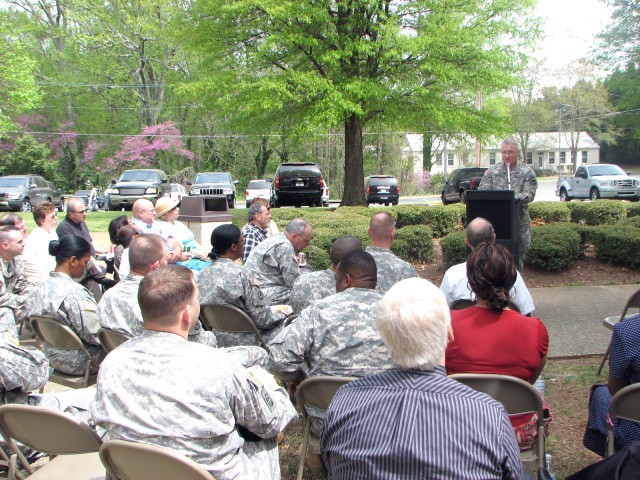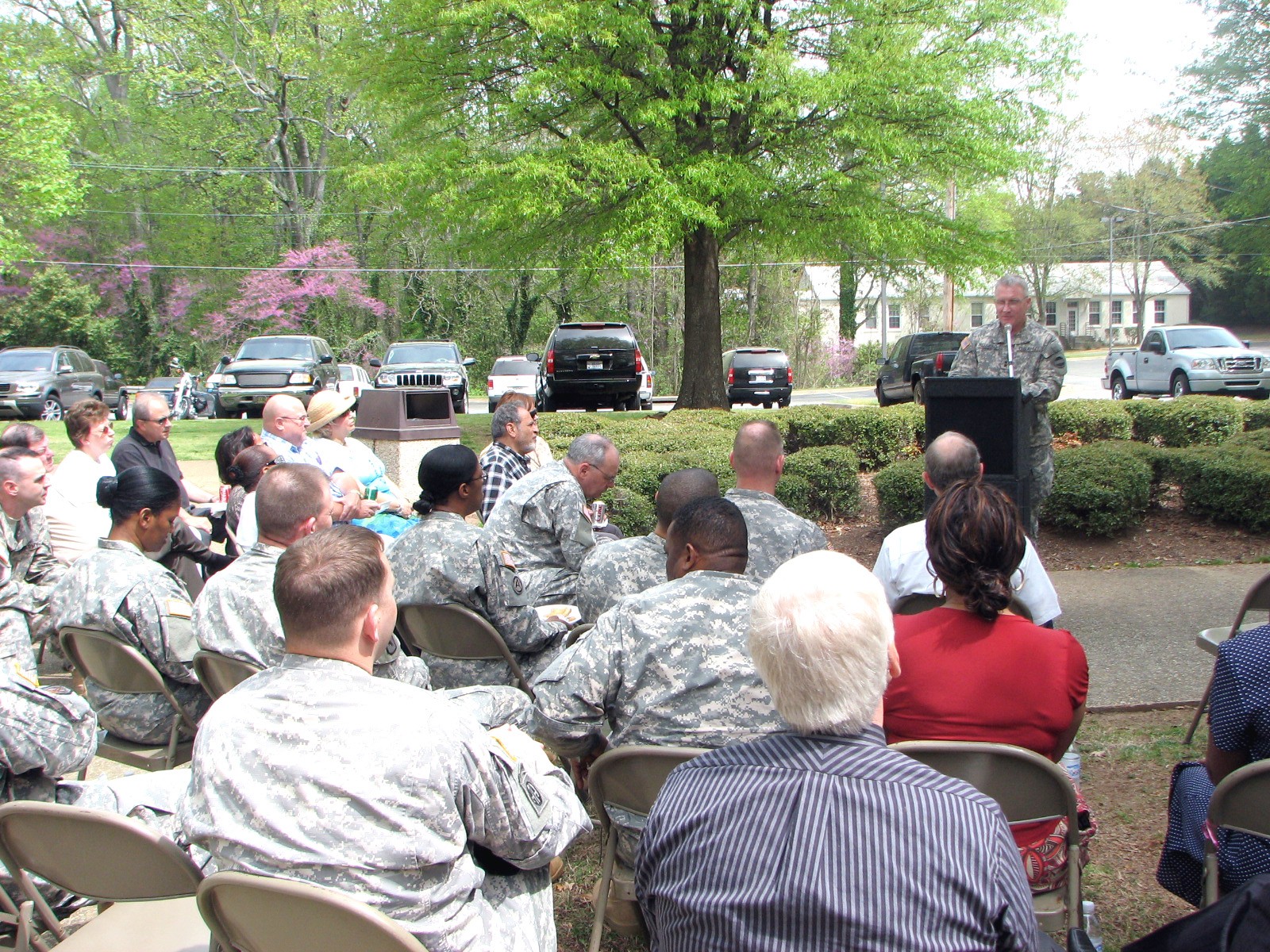
On April 7, in front of the Fort McPherson Chapel Center, Soldiers and Civilian employees gathered to hear words of wisdom from one of the installation's senior leaders.
In the first of a planned series of monthly, informal meetings, Maj. Gen. Jeffery W. Hammond, chief of staff, U.S. Army Forces Command, spoke to approximately 40 people about leadership.
Chap. (Capt.) Fred Wendel, Catholic chaplain, said he came up with the idea of holding such meetings a few months ago and decided to implement his idea. After one weekday Mass, he approached Hammond and asked him if he would like to be the first guest speaker.
Hammond agreed, and used his time to speak of his leadership experiences during his 31 years in the Army.
"Leadership is mental, physical and spiritual," Hammond said. "Leaders touch hearts and change lives."
Because leaders have this power, Hammond said it's important for them to have good character.
Hammond added character is built through hard times. "Life is hard. It has problems," he said. "Only through hard times do you develop character."
To get through tough times, Hammond spoke of his Christian faith and how it supports him, adding he believes he was made by God and believes the skills he learns on Earth will be of later use during his afterlife.
In addition to his belief in a deity, Hammond said his leadership also benefits from the power of his belief in others.
"Everyone may not be as good as you think, but everyone brings something to the table if you can find it," he said.
Finding that is important, as leaders aren't just born, but made, said Hammond, who said he believes leaders should inspire and pass the leadership mantle onto those under their command.
To help showcase the power of leadership, Hammond told a story about Maj. Mark Rosenberg, a Soldier under his command in the 4th Infantry Division. During the battle for Sadr City, as part of Operation Iraqi Freedom, some soldiers from the Iraqi army were tentative and unwilling to continue fighting.
Rosenberg asked Hammond to let him handle the situation, and using his skills as a leader, spurred the soldiers onward, motivating them to take key terrain in the city.
"We had a Jewish guy leading an Arab, Muslim army in a key strategic battle in Sadr City," Hammond said. "All because one man said 'follow me.'"
While Rosenberg's story showed the power one man can have, as well as what can happen when a leader allows his or her subordinates to take charge of a situation, his story also showed the poetential tragedy associated with leadership.
After his heroics in Sadr City, Rosenberg was killed April 8, 2008, when the vehicle he was traveling in struck an improvised explosive device in Baghdad.
Rosenberg was one of 94 Soldiers Hammond lost while commanding in Iraq.
Hammond spoke of the pain that comes with losing someone, and how although he went to visit Rosenberg's Family, the pain still remains. Such pain is natural, said Hammond, because leaders with good priorities love their Soldiers, their Soldiers' Families and the Civilian support system.
That love, Hammond said, means loving all these groups more than oneself. Hammond's message of love was a point that resonated deeply with Sgt. Luke Hendricks, a chaplain assistant at FORSCOM.
"That (loving others) is something I can do every day as a human being," he said, adding he also took to heart Hammond's message to credit the team when things go right and take the blame when things go wrong.
Lt. Col. Jack Shedd, plans, operations and training chaplain, FORSCOM, was another attendee. Like Hammond, he lost a friend while deployed and said he could relate to the difficulties of facing loss.
Thankfully, he said the Army is working hard to train individuals to help Soldiers deal with such events. In this way, Shedd said that anyone can be a leader in the sense of helping others out and leading them through tough times.
"Rank doesn't matter," he said. "Anyone can be a leader." Shedd said he agreed with Hammond that difficulties produce character and people going through difficulties can't use those difficult times to wallow.
"It argues against self-pity. Everyone goes through it (difficult times)," Shedd said.
In closing, Hammond said leaders must realize constant leadership is critical, and leaders must love the times they are in charge.
He encouraged those in attendance to keep their priorities straight, take care of themselves and remain true to the fundamentals of Army leadership.
"Soldiers will follow and believe in you if you treat them as you want - deeds not words," Hammond said. "Assume the same burden they (subordinates) do, lead from the front, assume risk when it benefits Soldiers and take no special privileges or advantages (from leadership)."
Overall, Wendel said he was very pleased with Hammond's speech and crowd turnout, stating they "exceeded expectations."
Wendel said he hopes to continue this success. Plans are to hold a session monthly. No dates are set, he said, because it will depend on the availability of speakers.
Wendel said that any leader who feels he or she may have relevant life experiences to share is encouraged to contact him at 404-464-1259.

Social Sharing